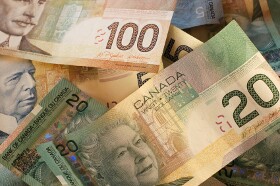The Canadian dollar is weakening against most major currency rivals to finish the trading week, despite the national economy beating market forecasts in November. The loonieâs fall is being mostly driven by a drop in energy prices caused by demand concerns amid the Wuhan coronavirus. The nationâs fiscal picture and inflation also rose more than what the market had projected.
According to Statistics Canada, the gross domestic product (GDP) rose 0.1% in November, coming in better than the flat forecast. This is up from the 0.1% decline in the previous month.
The economic expansion happened after an unanticipated cold snap blanketed central Canada and lifted utility consumption. Also, the goods-producing industries and services sectors each enjoyed a 0.1% rise. There were considerable contractions in mining, oil and gas extraction, transportation, and warehousing. Of the 20 industrial sectors monitored by the statistics agency, 15 of them reported gains.
The producer price index (PPI) advanced 0.1% in December, up from the 0.1% drop in the previous month. The market had anticipated no change. Raw material prices also surged 2.8% last month, up from the 1.4% boost in November.
Meanwhile, the federal budget deficit widened to $2.7 billion in November, up from $2.22 billion in the same month a year ago. While revenues surged 3.1% to $26.16 billion, spending soared 5.2% to $27.22 billion. Public debt charges did fall 3.4% to $1.78 billion.
On Friday, energy prices extended their slump as the coronavirus outbreak is expected to dampen demand expectations in the first quarter. With steady global output levels, the market could soon endure a supply glut. The latest death toll has risen to 170 and confirmed cases are approaching 10,000.
March West Texas Intermediate (WTI) crude oil futures shed $0.74, or 1.42%, to $51.42 per barrel. April Brent crude futures fell $0.96, or 1.67%, to $56.37 a barrel. March natural gas futures were flat at $1.84 per million British thermal units. March gasoline futures were also unchanged at $1.50 per gallon. March heating oil futures dipped $0.015, or 1.02%, to $1.625 a gallon.
Crude prices have cratered 16% this year, which could impact the Canadian economy in the first quarter of 2020 as the energy commodity remains a significant export.
The USD/CAD currency pair rose 0.24% to 1.3240, from an opening of 1.3208, at 18:33 GMT on Friday. The EUR/CAD soared 0.71% to 1.4676, from an opening of 1.4571.
If you have any questions, comments, or opinions regarding the Canadian Dollar, feel free to post them using the commentary form below.

Canadian Dollar Slides As Coronavirus Fears Hurt Energy Prices
More from NewsMore posts in News »


Be First to Comment